#lockwood giving lucy agency and respect and protection
Text

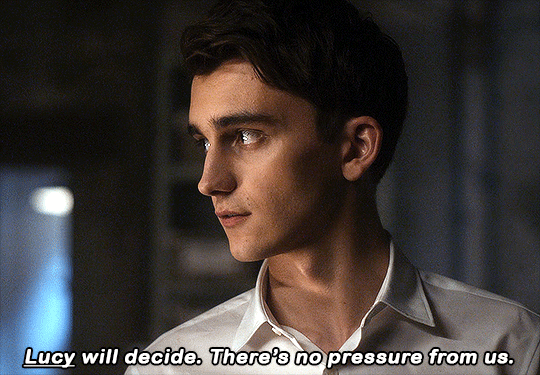

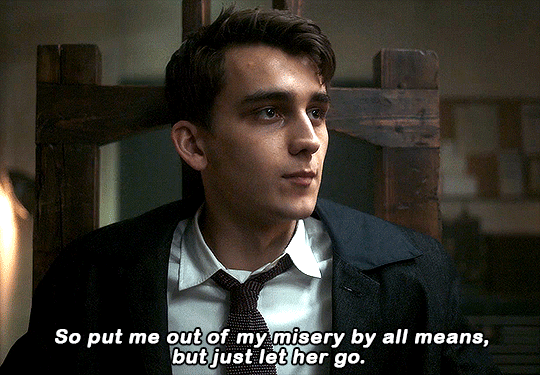
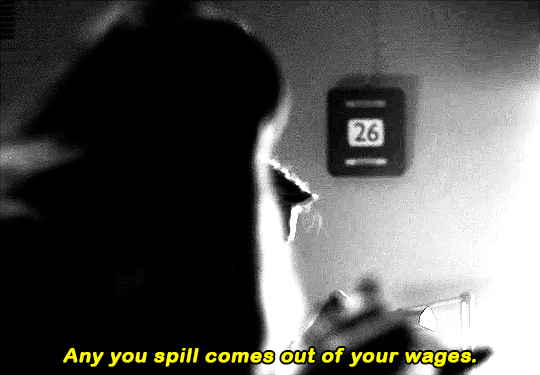
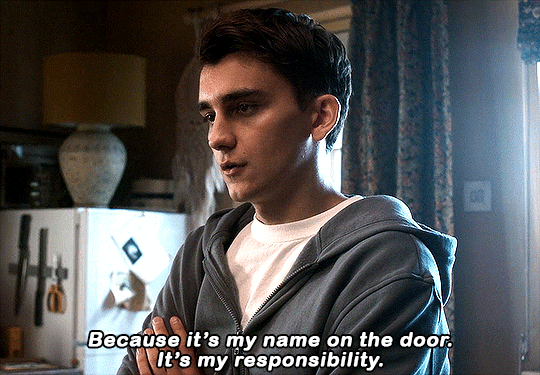

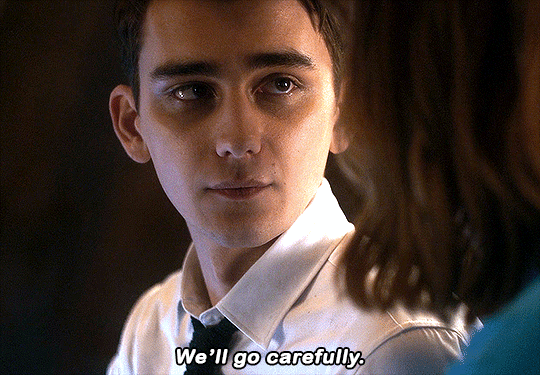

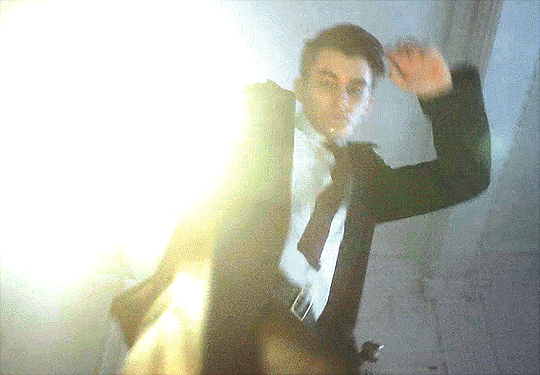
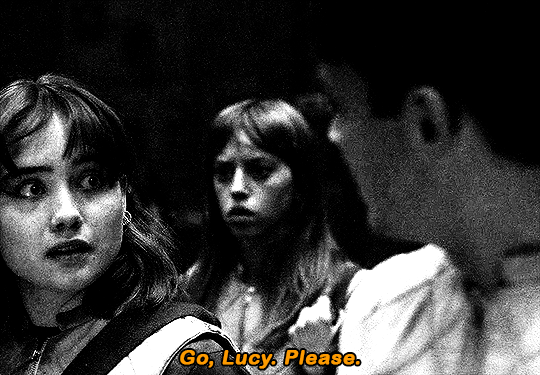
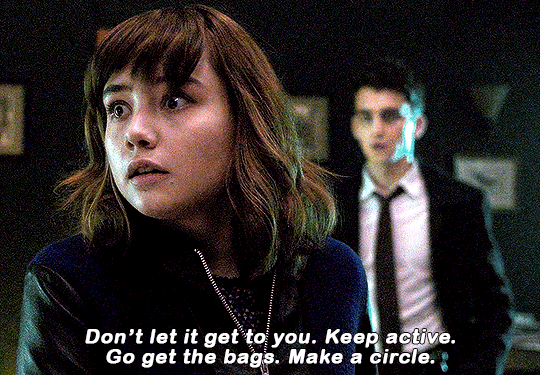
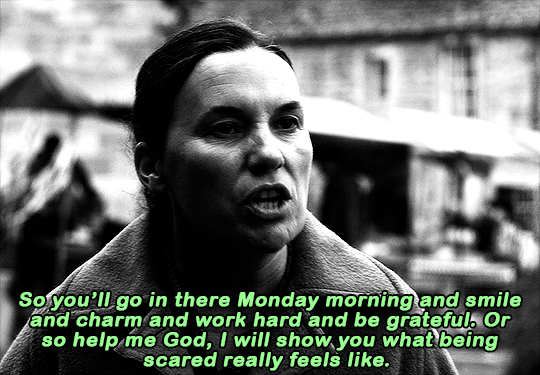





Lockwood vs. "everyone back home"
LOCKWOOD & CO.
#lockwood & co#lockwood and co#lockwoodandcoedit#anthony lockwood#anthonylockwoodedit#lucy carlyle#lucycarlyleedit#locklyle#locklyleedit#filmtvcentral#smallscreensource#tvedit#flashing gif#tw abuse mention#pearlcaddyedit#pearlcaddy l&co#500#1k#lockwood giving lucy agency and respect and protection#while also challenging her not to hide in her comfort zone#safety and empowerment going hand-in-hand (just like locklyle)#he doesn't even know her past but he's helping her heal from it instinctively
2K notes
·
View notes
Text
Lockwood & Co Book Thoughts
Can’t believe it’s over. I’ve finished all 5 books and the short story, and wishing there was more.
I can’t even begin to describe how amazing that series was, how perfectly everything in the story fit, and how masterfully handled all the relationships were.
Reader, take a seat as I am about to ramble.
And also, SPOILERS GALORE from this point on.
Lockwood & Lucy
Lockwood and Lucy were fantastic, and truly, to anyone who ever considered their relationship “subtle”, they must have been reading different books. Sure, they didn’t get to snog, but it doesn’t take a genius to figure out what hadn’t been written. After turning that last page, I know what came next. They are truly, undoubtedly, I’ll-stake-my-mother’s-life-on-it in love. They love one another so much. Lockwood would give his life for Lucy (he truly was GONNA), and Lucy WOULDN’T LET HIM.
It’s not even about the jewelry Lockwood gave Lucy, either, though that is a pretty good indicator, but it’s all the things he says and does. It’s the way he looks at her, turns to her, is vulnerable with her. Lockwood and Lucy almost talk with their eyes. He knows her more than anyone else, simply from his proximity and his observations of her. I can go on and on about his heart eyes and his need for her approval (in this, we know Lucy does the same to him), so
I will.
First of all, Lockwood does consider Lucy attractive. Lucy doesn’t like the way she looks, but that’s just regular self-consciousness, which we all have in spades, no matter how amazing our own better qualities are. Lockwood so easily complimented the way she looked when she got dressed up for the Fittes’ ball. He never criticized the way she looked or dressed, and while he had occasionally mentioned the size of her body, which Lucy’s self-consciousness interpreted as being a criticism, it was never about that with Lockwood. Lockwood’s mention of her body-type has everything to do with what it was capable of, of its strength, even its athleticism. Lockwood absolutely likes how Lucy can brawl with the best of them. Absolutely. He never treated Lucy like a frail flower until he actually saw her bleeding, which is truly a testament to how he respected her physical abilities. He’s a little more careful with her psychic abilities, but that’s a whole different discussion.
The point is, Lockwood always liked the way Lucy looked. She is his type. There were clearly several, more attractive people around them, Holly being the most beautiful of them all, with a really lovely personality, but Lockwood’s eyes NEVER strayed. Never. He took care of Holly, but there wasn’t an indication of Lockwood ever being vulnerable with her as he was with Lucy. We know this because it’s one of the things Holly indicated to Lucy after Lucy’s months-long absence—that she couldn’t crack the boys the way she knew Lucy did, and she was hoping Lucy can give her tips. Lockwood is a caretaker, and he takes care of those who thinks need protecting. When Holly first started, she was rusty on the field and Lockwood knew it. He was their leader and he felt responsible for all of them. He knew Lucy could handle herself and Holly couldn’t. Towards the end of the series, as Holly got more experience on the field, Lockwood looked out for her less. Lucy was always Lockwood’s second on the field. George’s seniority gave him second chair in the agency, but it was Lucy Lockwood depended on when they were fighting side-by-side. He always trusted that she could watch his back.
They were perfect partners on the field. He alludes constantly to how well they work together, how he missed her when she left them for a few months after The Hollow Boy, how she has her own mind, that he is always thinking about her, how he trusts that she would always have his back. That last part always bowls me over, because Lockwood would always tell Lucy to let him go alone, and she never listens, and he just knows she wouldn’t, so ordering her to let him do something alone was almost perfunctory at a certain point. And of course we know that no matter how far Lucy runs away, no matter how forcefully she goes out and does things by herself, Lockwood would ALWAYS follow. He simply wasn’t going to let Lucy go off by herself, getting herself killed.
They complement each other perfectly, with Lockwood’s confidence, style, skill, and balls like dynamite, he is capable of doing the impossible, improbable, and lead armies into battle. And he is strong enough, good enough, to inspire Lucy’s loyalty and cooperation.
Lucy is A FORCE. She gets frightened and is aware of her limitations, but she will power through the fear and self-doubt, she will do what she has to do. She might not be the most graceful about it, but she will get things done. She will enforce. She will barrel through with whatever she can get her hands on—a 4x4, a hammer, a vase, her foot, her entire body, the forces of fucking physics. I pity the fool who dares to hurt Lockwood and George. The ones who dared threaten her other friends—Holly, Kipps, and even Skull. They will know Lucy Carlyle.
And then we get to the groveling, the way he did everything to get Lucy back to Lockwood & Co., back to 35 Portland Row. How after he had managed to talk he back into working with the agency, he kept reminding her how they had such a great partnership. We don’t get to see Lockwood like this until The Creeping Shadow (book 4), but we were treated to it so early on in the Netflix series. This is mainly because Lucy is more bedazzled by Lockwood’s charisma and confidence in the books. Netflix!Lucy is more disillusioned from the get-go from the things she’d already seen and experienced on her own, so it’s only natural that she is quicker on the uptake when she first walks into Portland Row, and how she more swiftly realizes Lockwood’s recklessness as early as the antique shop incident with the Winkmans. In the books, Lucy doesn’t become overly concerned by Lockwood’s tendency to forgo his safety to ensure hers until The Hollow Boy. It featured daily in her anxieties in The Creeping Shadow, and then she accepted it as fact in The Empty Grave, where she did everything she could to prevent him from sacrificing himself for her.
A lot of things happened in The Empty Grave, with the spectacular events of the Problem coming to a head. I don’t think I’ve ever loved a book ending as much as this. But as far as Lucy and Lockwood go, this was amazing.
It starts at The Creeping Shadow, for sure, but in The Empty Grave, Lockwood has stopped pretending that he wouldn’t always turn to Lucy first, that she and he share a special bond. Lucy says so—they are closer than ever. Lockwood takes time alone with her every chance he gets; Lucy seeks Lockwood when she doesn’t see him.
Lockwood was mesmerized by a ghost because it took Lucy’s form (by the way, I WANT TO SEE THIS SCENE IN NETFLIX. From the time Lockwood falls under the La Belle Dame’s spell to Lucy’s death-defying trapeze act to save his life), we know because HOLLY thought she saw Lucy, and we also know from previous male victims that the La Belle Dame’s ghost took the form of whomever her victim most desired. It’s what she did in life, so it’s what she does in death. With women, as was with Lucy, the La Belle Dame tapped into Lucy’s isolation and vulnerability—again, something the La Belle Dame understood when she was alive, as she seemed to take special disregard in the wives of the men she ensnared. Her manifestations between men and women as a ghost reflected how she impacted them in life.
And we all could see at this point how everyone else knew how Lockwood and Lucy felt about each other, probably since book 1, but it was only in The Creeping Shadow that Lockwood actually began to get obviously aware of it.
Jonathan Stroud likes to heavily imply things rather that put it out there. He does it with Flo and George, Holly and her roommate, and most distinctly with Lockwood and Lucy. I bet that if you asked Stroud outright whether Lucy and Lockwood ended up together, he would say, “Short of making them kiss on the page, I don’t think I could have been more obvious.”
Which brings me to the other characters in the books.
George Cubbins (aka George Karim)
George’s value to Lockwood & Co. cannot be overstressed. He is the reason they actually had purpose to everything they did. They could not have defeated any of those ghosts without George, at least not without loss of life. It was George who inspires the most brilliant or/and most outrageous ideas, whether they came from Lockwood, Lucy, or George himself. He is some kind of eccentric Muse to Lockwood & Co.
I confess that my mind’s eye of George goes from Book!George to Netflix!George, depending on what he’s doing in the books as I read about him. When he is eating and inadvertently flashing his butt crack, I definitely imagine him as Book!George. When he is wild with research, teaming up with Flo, and when he got beat up, I am totally imagining Netflix!George.
Lucy is right in saying he was the best of them in the Netflix series. He is their constant, particularly in the books. He is the person they relied on to seek answers and they know that with him around, they would find a way through the seemingly impossible questions, which is why their entire world got upended when George got beat near to death. The fact that he couldn’t even be at the house did a number on them all. They couldn’t make heads or tails of anything without George, and in their helplessness, they did Research the only way they knew how—break into a library, steal Stuff, and blow the entire house down, bodies at their wake. George would never. At least not the exploding part.
In the books, George joined their caper in the Black Library, and he was exceptionally bad at it, getting stuck under a shelf or table of some sort. In the Netflix series, they left him out, and rightfully so. It was not George’s thing to break things in a library, which is all Lucy and Lockwood did in them.
George incites Lockwood and Lucy’s most protective instincts, and when George got hurt, Lockwood and Lucy plotted revenge. They didn’t even argue about it. Lucy was, “I’m going to kill them all! I am SO GOING TO MAKE THEM SUFFER.” And Lockwood was like, “Yes. And. We’re going to steal that book back as we do it. And if we burn everything else down, so be it. Won’t be the first time.” No argument after that. They just agreed to do it like the maniacs they were.
It’s Protect George at All Costs. If anything happens to George, Lucy and Lockwood will burn down the entire world. Everyone knows this because everyone who was in on the plan accepted it as fact.
And Then of Course There’s Skull
I’m going to take a moment to appreciate the sheer skill in which Stroud wrote Skull as a character.
The book is so full of complex characters, but to write someone to be so despicable and yet have all of us rooting for the little fucker is a tremendous feat. And no, Skull is not like the Draco Malfoys and even the Jamie Tartts of fandom.
No. Let me explain.
Draco Malfoy was NOT a likeable character. Not in the slightest. Whatever redeeming qualities he had was plucked and cultivated by fandom. He became complex because the fandom examined Malfoy down to the threads of his expensive robes. It was fandom and fanfic who reshaped Malfoy’s post-HP character.
Jamie Tartt sucked at the beginning of Ted Lasso, but his character DID grow. He became a better person on the show. He redeemed himself like a decent human being, so he IS lovable. He’s pretty amazing and OF COURSE we’re rooting for him now. That’s pretty much the arc they wrote for him.
Skull is different in that he didn’t change one bit. Not a single bit. He was every bit as despicable from beginning to end, and yet his last final appearance in the book, he did save Lucy and Lockwood. Did he feel friendship? Maybe. But it never seemed like he did things for anyone other than himself, even if it looked like it did. Did he really do it for friendship? I think he did it for vanity. He wanted to show Ezekiel and Marissa that he wasn’t weak, that he was stronger than Ezekiel himself. A ghost having feelings seems far-fetched. He was an evil little thing in life and he wasn’t that much different in death, and we will never truly know why Skull saved them in the end, but if there was ever a person who can motivate a ghost to feel something, it would be Lucy.
I laughed when everyone else finally met Skull on the Other Side and they heard him speak. Lockwood immediately asked, “Is that how he always talks to you?” Like, of course Lockwood would be concerned, because Jesus Christ. Skull is just terrible and poor Lucy has to hear it all the time. Lockwood is understandably concerned.
Skull is just awful, and yet we all think he’s Lucy’s bff and some of us even believe Skull wants Lucy all to himself. I personally wanted him to survive that blast. I kept wishing Stroud would leave us with that.
What a fantastic character Skull is. (Why is it that all dudes with his character look like Spike from Buffy the Vampire Slayer?)
And it’s a little funny that Quill kind of gets him.
Quill Kipps
Where do I begin with this guy. He was a massive prick at the beginning of the series, for sure. He was worse in the books than he was on Netflix, for sure, but I always imagined Netflix!Quill as I read him. He is the Jamie Tartt of Lockwood & Co., the character that showed the most growth.
I was already sold on him because of the show, but I absolutely appreciated him fully in The Hollow Boy, when it became clear to me that all he really wanted was to keep all agents safe, to stop the madness of the Chelsea outbreak because it was costing lives. He just wanted to be useful again, and I can’t tell you how tickled I was by his unbridled enthusiasm when the glasses allowed him to see the ghosts again.
And then he was just part of Lockwood & Co. They call him a consultant, but that’s just a load of bullshit. He is as much Lockwood & Co. as Holly is. When they realized how badly injured he was, the sheer panic of everybody, scrambling desperately for materials that could staunch the bleeding, and finding the means to transport him through a throng of murderous people and ghosts. They can call it whatever they want, but they all, Lockwood included, loved Quill enough to fight for his life.
I was seriously ready to write a rant post if Quill had gotten killed. My relief when he survived was the same as Lucy’s and the same as Lockwood’s (happy enough to hug him and worried enough to ask after him at the hospital).
I don’t think Quill ever lost his edge (aka His knee-jerk skepticism of Lockwood and his exasperation of George’s sagging pants), but he is completely trustworthy and brave.
Speaking of complex characters—
Holly Munro and Lucy Carlyle
I wanted to give Holly her own section, but so much of what I know of Holly stems from her relationship with Lucy.
As a character, I think she is the reason Lockwood & Co. are thriving. She knows exactly how to handle the clients they don’t need and she understands Lockwood’s goals well enough to book the clients that were worth the trouble. And it wasn’t always about the money and fame. Holly had a keen eye, not just for what Lockwood wanted, but also for what Lucy and George might enjoy. She is a true professional, and she is the magical, caring assistant that any organization could hope for.
Orderly, efficient, unafraid of offending important people because she had the looks and the smarts not to offend. The way Lucy described her, petals may as well float to the ground she walks on. Holly was beautiful, smart, classy, and the picture of poise. She could have fallen down a trash chute and she’d be dirty only in the right places. She could be covered in sludge and still look amazing. She cleaned, she catalogued, she was on top of things, and her fashion sense was impeccable. In short, Holly played on every insecurity Lucy had and Holly wasn’t even trying to do any of that.
We only come to find out at the end of The Hollow Boy that Lucy played into Holly’s insecurities, too, and it was Lucy’s own half-assed efforts to act like a mature adult that ended up grating at Holly’s generally sweet disposition.
I can tell that both Holly and Lucy made it work. So much hate is lobbed at Lucy for being thorny and irritable, but they were feeding each other’s contempt. Lucy seems more abrasive about it, but that is truly her way, unrefined by pleasantries and the more particular norms of decorum that tends to be easier for those in Holly’s social class. Lucy’s upbringing was less avocados and quinoa and more potatoes and gravy. Lucy did not have the money or the parental love to know the difference between “critical conversations” and unfiltered honesty, but she did know how to be polite enough, and both she and Holly were mature enough to deal with getting paired off during missions, at least until they decided to have it out at the end of The Hollow Boy.
In spite of all that, Holly and Lucy was keenly aware of the other’s gifts. They knew they had issues and they both did their best to work together, and just when they got to a place where they can be friends, Lucy pulls the rug from under them and leaves. Everyone is convinced it’s about Holly, but of course everyone is wrong.
At the end, Lucy and Holly came to appreciate one another. So much so that Lucy didn’t so much as blink at the suggestion of Holly moving into 35 Portland Row.
I wish there were more books. I wish Netflix would keep making new seasons.
I could not get enough, and I suppose all there is to do now is write fanfic.
#lockwood and co#lockwood & co#lockwood and co spoilers#lockwood & co spoilers#anthony lockwood#lucy carlyle#george karim#george cubbins#the skull#holly munro#quill kipps#lucy x lockwood#locklye#lockyle
312 notes
·
View notes